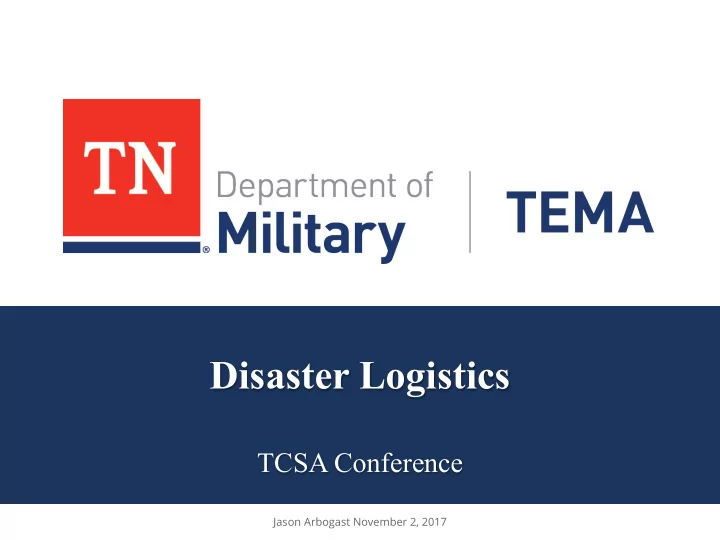

Disaster Logistics TCSA Conference Jason Arbogast November 2, 2017
TEMA and the State During Disasters • All disasters are handled by Local Emergency Management. • TEMA regional representatives respond to assist locals/coordinate State resource response. • Unmet needs and all requests for State assistance are sent to the State EOC for processing and tracking. • Locals/TEMA coordinate with FEMA to determine extent of damage to public and private property. • The Governor requests, then the President approves a Disaster Declaration • Once declared, disaster related costs are reimbursable.
Planning and Disaster Preparedness
Planning and Disaster Preparedness • Being prepared starts with preparing the individual. • Know your plans. Home, Work, City, County… • Exercise, exercise, exercise. • Have a kit/supplies ready and accessible.
Common Disaster Supplies
Common Disaster Needs • Staging Areas/Warehouses • Bedding • Fork lifts • Heating/cooling • Tents • Vehicle maintenance • Food/Meals • GIS/mapping • Lodging • Generators • Lighting • Boxes/Storage • Chainsaws • Gloves/Goggles/Safety Equipment • Fuel • Water • Building supplies • Shelter supplies • Animal shelter supplies
Community Resources • Walmart/Target • Lowes/Home Depot • Grocery Stores • Churches • Restaurants • Schools • Local Industry • Real Estate • Radio/Press
Dealing with FEMA • Not all disasters get FEMA assistance. • Disasters must reach a certain monetary threshold State- wide before a declaration. ($8.5 mil) • Once declared, costs for disaster related supplies and equipment are reimbursable. • FEMA Staff will respond for damage assessments, applicant Briefings, JFO operations.
Types of FEMA Reimbursement Emergency Work Category A: Debris Removal Clearance of trees and woody debris; certain building wreckage; damaged/ destroyed building contents; sand, mud, silt, and gravel; vehicles; and other disaster-related material deposited on public and, in very limited cases, private property. Category B: Emergency Protective Measures Measures taken before, during, and after a disaster to eliminate or reduce an immediate threat to life, public health, or safety, or to eliminate or reduce an immediate threat of significant damage to improved public and private property through cost-effective measures.
Types of FEMA Reimbursement Permanent Work Category C: Roads and Bridges Repair of roads, bridges, and associated features, such as shoulders, ditches, culverts, lighting, and signs. Category D: Water Control Facilities Repair of drainage channels, pumping facilities, and some irrigation facilities. Repair of levees, dams, and flood control channels fall under Category D, but the eligibility of these facilities is restricted. Category E: Buildings and Equipment Repair or replacement of buildings, including their contents and systems; heavy equipment; and vehicles. Category F: Utilities Repair of water treatment and delivery systems; power generation facilities and distribution facilities; sewage collection and treatment facilities; and communications. Category G: Parks, Recreational Facilities, and Other Facilities Repair and restoration of parks, playgrounds, pools, cemeteries, mass transit facilities and beaches. This category is used also for any work or facility that cannot be adequately defined by Categories A-F..
Disaster Documentation • Save EVERYTHING – receipts, hours, notes. • Take good notes on damage, use of supplies, locations. • TEMA WebEOC will track all State requests/information. • Take pictures. • FEMA will require written justifications on all costs. The better your paperwork, the more likely you are to be reimbursed without question. • Assign a documentation person.
Long Term Recovery • Recovery can last weeks, months or years. • Debris removal • Transitioning from sheltering to homes • Economic recovery • Schools • Mitigation projects • Getting back to “normal”.
Contact Jason Arbogast Tennessee Emergency Management Agency Jason.argbogast@tn.gov (615) 741-6469
Emergency Management through Procurement Prepared by Helen Crowley
Central Procurement Office • State Procurement Website – http://www.tn.gov/generalservices/section/central-procurement- office • TNSmartShop and Contract Listing – https://sso.edison.tn.gov/psp/paprd/SUPPLIER/SUPP/h/?tab=PAPP _GUEST
Edison Portal
Contracts • What should I look for on a contract before ordering? – Will the supplier extend their pricing to local governments? – Will the specifications of the product or service meet my needs? – How quickly can I get it? – How will it be delivered?
Contracts
Contracts SWC 537 – Contract Instructions
Recommend
More recommend